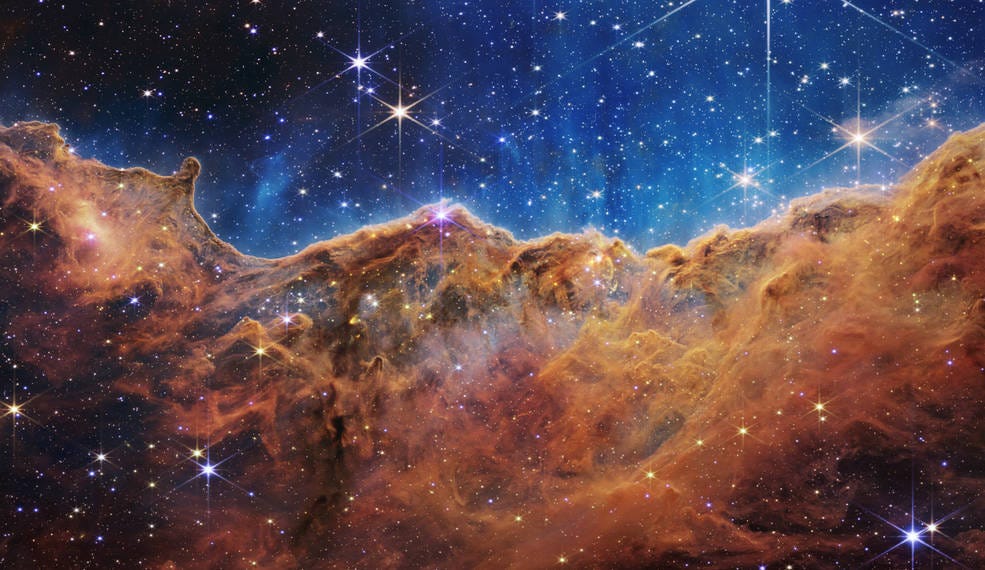Accepting the Universal Christ
One of the things I’ve gathered from reading scholarship about the historical Jesus is very little about him can be said with certainty. Historians generally agree he existed and was crucified, but, beyond that, almost everything is debated. Absent the invention of a time machine, I don’t think our understanding will get much clearer.
Even if we could go back and meet Jesus, would we be happy with what we found? Surely, there was some perennial core of his teaching we’d find useful, but this is someone who lived over two thousand years ago. He’d likely have some regressive views on a number of issues, to put it mildly.
Needless to say, I think basing religious faith on the Gospels or the historical Jesus is shaky ground. This is where I find the Franciscan priest Richard Rohr’s concept of the Universal Christ to be so helpful. Others have used the term Cosmic Christ to describe the same idea. In short, it’s a panentheistic conception of God distinguished from Jesus of Nazareth.
“What if Christ is a name for the transcendent within of every ‘thing’ in the universe?” Rohr writes. “What if Christ is a name for the immense spaciousness of all true Love? What if Christ refers to an infinite horizon that pulls us from within and pulls us forward too? What if Christ is another name for everything — in its fullness?”
My favorite spiritual author is a Hindu perennialist named Eknath Easwaran. He talks about ‘the Christ within,’ a phrase he uses interchangeably with ‘Krishna’ and ‘the Atman.’ When Easwaran talks about Christ in this way, it seems clear he’s not talking about a first-century preacher subject to the prejudices of time and place, but, rather, something else.
Not to put too fine a point on it, but Easwaran, a vegetarian, says those who are unaware of the unity underlying all life are playing spiritual games. As far as I’m aware, he didn’t challenge the canonical story of Jesus eating fish. Given these facts, I’m fairly sure Easwaran is using “the Christ within” to mean something similar to the Universal Christ.
I’m an animal activist. So the place of nonhumans within Christianity has been the biggest barrier for me embracing the religion of my ancestors. No doubt, for others, there are different theological obstacles. But, as far as I can see, the concept of the Universal Christ allows you to elide all of that and build a progressive faith.
You can keep what you want from classical Christianity, reinterpret it, and forget the parts that don’t feel genuinely inspired by God. For instance, in the Lord’s Prayer, when Jesus talks about doing God’s will on earth as it is in heaven, I think about building the Peaceable Kingdom, as it’s described in Isaiah. That might not have been what the historical Jesus meant, but it doesn’t matter.
From my perspective, in the modern world, where we are so aware of the diversity of faith traditions, there are only two rational responses — perennialism or atheism. In other words, it’s all true to varying degrees or none of it’s true. Besides the higher value Hinduism puts on nonhuman life and suffering, one of the things I most admire about the religion is how perennialism is baked into the foundational texts.
For instance, in The Bhagavad Gita, Krishna says all paths lead to him. In contrast, classical Christianity generally argues salvation is only available through Jesus Christ. The concept of the Universal Christ makes a more perennialist Christianity possible. We can say good Muslims, Buddhists, Jews, Hindus and atheists are filled with the Universal Christ, though they call it by other names.
I’ve mentioned elsewhere that I think it’s important for the political left to reclaim the mantle of religion, as far as it’s possible. So I’ll say that, despite being deeply flawed and broken, I’m a follower of the Universal Christ. In that sense, I’m a Christian.


